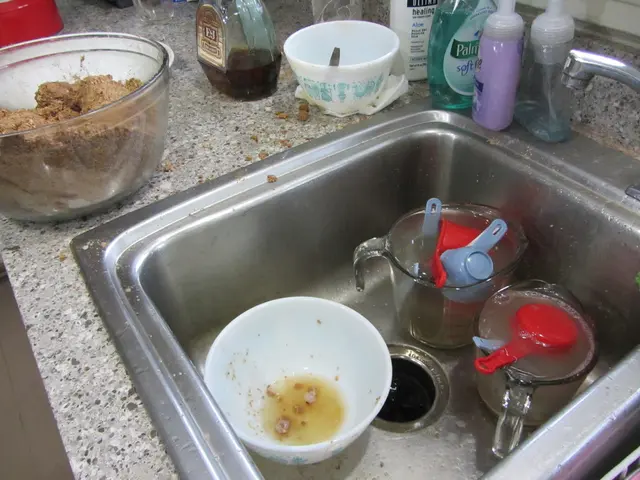Exploring tranquility in the face of death: Uncovering the benefits of psychedelics for managing terminal illness-related anxiety
Psychedelic Therapy Transforms End-of-Life Care
A new wave of research is exploring the potential of psychedelic-assisted therapy as a revolutionary approach to palliative care for those facing terminal illnesses. Programs and clinical trials worldwide are investigating the use of substances like ketamine and psilocybin to alleviate psychospiritual distress, such as anxiety, despair, and existential suffering, which conventional treatments often struggle to address.
One pioneer in this field is Lou Lukas, a palliative medicine teacher at the University of Nebraska Medical School. Lukas is currently conducting a trial of a psilocybin protocol for people with pancreas cancer, aiming to transform life after a terminal diagnosis.
Lukas emphasizes the importance of initiating conversations about making meaning out of life, especially with terminally ill patients. He believes that psychedelics have the potential to help patients realize the beauty and magnificence of life when there's not much of it left, fostering a sense of intimacy and appreciation for life that can be passed down from generation to generation.
During the trial, participants undergo six to eight hours of preparatory counseling, a day-long dosing session, and several sessions of integration afterwards. The effects of psilocybin are felt immediately after the dosing session is finished, with many patients expressing feelings of amazement and a sense of being in the presence of love.
The University of Rochester Medical Center (URMC) launched the first U.S. ketamine-assisted psychotherapy program for palliative care in June 2023, showing early success in reducing fear and psychological distress in patients with serious illnesses such as advanced cancer and neurological diseases. This program integrates guided psychedelic experiences with psychotherapy to help patients find meaning and peace.
In Europe, a large multi-site clinical trial called PsyPal began enrolling patients with palliative care needs from conditions like COPD, multiple sclerosis, ALS, and atypical Parkinsonian disorders in 2025. This trial aims to improve connection, meaning, and peace for over 100 patients across several countries.
Canada's Psyence BioMed is advancing clinical trials on natural psychedelic therapies targeting serious mental health challenges, including cancer-related psychological symptoms. With recent protocol expansions, the aim is to increase impact and patient access.
UCLA is conducting a phase 2 randomized controlled trial studying psilocybin therapy for demoralization in adults near the end of life (with life expectancy under 2 years) to evaluate safety and efficacy. This reflects growing research interest in psilocybin’s therapeutic role in palliative care.
As these trials progress, the potential for psychedelic therapies to support patients’ spiritual and existential well-being is becoming increasingly recognized. Ongoing and upcoming clinical trials over the next few years are expected to clarify optimal protocols, safety, and long-term benefits, positioning psychedelic-assisted therapy as an important complement to conventional palliative care practices.
While most people diagnosed with pancreas cancer have a couple of months to live, some might live a year or a year and a half. Lukas proposes the idea of periodic psychedelic experiences as a form of ritual bath or mikvah, a time for self-reflection and connection with the universe. He encourages palliative doctors to initiate conversations about making meaning out of life with terminally ill patients and advocates for more physicians who feel called to edge-walking, bridging the gap between the medical and psycho-spiritual worlds.
The current progress reflects an emerging paradigm shift where psychedelic-assisted therapy is gaining acceptance as a promising, meaning-centered option to alleviate severe psychological and spiritual suffering in terminally ill patients. While still in experimental and early clinical stages, the potential for these therapies includes profound relief from anxiety, depression, existential distress, and improved quality of life, which traditional approaches often do not fully achieve.
- Science is delving into the possibilities of psychedelic-assisted therapy as a groundbreaking approach for workplace wellness, addressing chronic diseases like cancer and respiratory conditions.
- Good sleep is essential for those undergoing psychedelic therapies, as it aids in digestive health, eye health, and overall health and wellness.
- Fitness and exercise are crucial components of health maintenance during treatments for autoimmune disorders, mental health, and mens health.
- Nutrition plays a vital role in skin care and managing weight, making it an important factor to consider during therapies and treatments.
- Aging gracefully involves taking care of one's hearing and maintaining mental health, both of which can be supported through various therapies and treatments.
- Sexual health is a crucial aspect of personal growth, and ongoing research is examining its connections with psychedelic therapies.
- Skin conditions, including psoriasis, can be managed by leveraging the benefits of medicinal cannabis (CBD).
- Neurological disorders can have a significant impact on one's neurological and cognitive functioning, but ongoing education and self-development fostered through mindfulness and productivity can help manage symptoms.
- Career development and job search often require goal-setting and skills training, which can be facilitated by psychedelics in promoting motivation and focus.
- Sports can provide an outlet for managing stress and improving overall health and wellness, with basketball being a popular choice for many.
- The NCAA Basketball season offers an opportunity to engage in sports analysis, fostering a sense of connection and community.
- Medication management, such as Medicare coverage for psychedelic treatments, is a key factor in ensuring accessibility for those in need.
- Palliative care for cancer patients often involves addressing psychological and spiritual concerns, which can be effectively managed through psychedelic therapies.
- Palliative care for patients with neurological disorders like Parkinson's can benefit from psilocybin therapy, as it aims to improve connection, meaning, and peace.
- Cardiovascular health is crucial for maintaining vitality during and after treatments, with a balanced diet and regular exercise playing essential roles.
- Parenting involves making difficult decisions, and goal-setting can help navigate the challenges of raising children and managing various health conditions.
- Children with chronic diseases like asthma can benefit from proper nutrition and exercise, ensuring optimal respiratory health and overall wellness.
- Ongoing research in psychedelic therapy for mental health concerns, such as anxiety and depression, shows promise in achieving profound relief for those struggling.
- Support groups and therapies for women's health, including fertility issues and menopause, can include mindfulness practices to improve overall well-being.
- Skin conditions like eczema can be managed by incorporating mindfulness, proper skin care, and avoiding stress-inducing activities like sports betting.
- Aging involves a multitude of changes, including hormonal imbalances and skin conditions, but with proper care, education, and self-development, one can navigate the challenges of aging gracefully.





